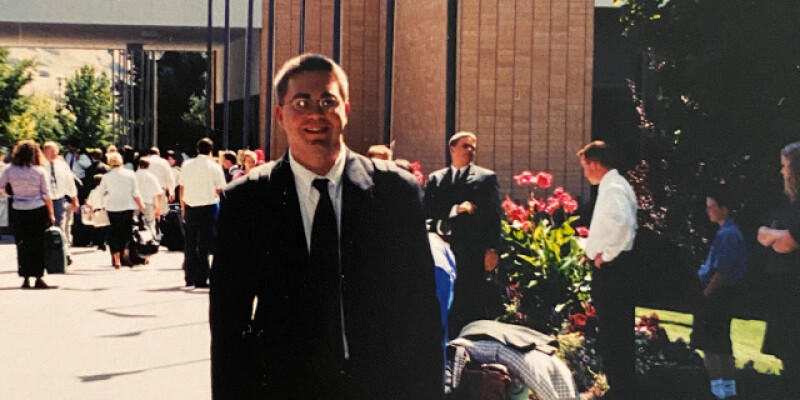Every generation has a “where-were-you-when question.” For the Greatest Generation, it was the Pearl Harbor attack. For baby boomers, it was the assassination of John F. Kennedy. And for millennials? It is 9/11. I have always felt my answer to the question, “Where were you on 9/11?” is a little unique.
I was in the Provo Missionary Training Center, preparing to serve in the Russia St. Petersburg Mission.
On the morning of September 11, 2001, a Tuesday, my district was assigned to complete our weekly hours of service by cleaning bathrooms in one of the MTC’s many buildings. When we arrived to clean at around 7:00 a.m., the woman in charge of giving us our assignments told us that two planes had crashed into the twin towers of the World Trade Center—and that the news was calling it a terrorist attack.
Learning of the attack secondhand, without direct access to the media, was unusual and confusing. I do not think I grasped the magnitude of the situation at the outset, or fully understood how greatly this would impact so much about how we live our lives on a day-to-day basis. I did not see any actual video footage in real time, like so many others. In fact, I did not see any video of the burning buildings until nearly six months later, when I happened to catch a glimpse of it on a television in an investigator’s home. I spent that morning in the MTC not quite sure what had happened. At one point, I overheard one missionary telling another that both towers had entirely collapsed. But that seemed impossible to me, and I chalked it up to an unfounded rumor.
A few hours after the attack, the MTC president, David B. Wirthlin, made an announcement over the MTC’s PA system. I was shocked to learn that both towers had indeed collapsed. I felt an incredible amount of sorrow for those who had needlessly lost their lives, and frightened for the future of our country, and the world.
That evening, like every other Tuesday, the MTC had a devotional for all missionaries. President Wirthlin spoke and said something that resonates with me to this day. He said that the terrorists had tried to destroy our country by trying to destroy the symbols of our trade, military, and leadership. But that they could only destroy material symbols, and that what makes our country truly great is the hard-working, righteous, good people who live here.
As I look back on my experiences with 9/11 twenty years ago, one thing that stands out in my memories is how grateful I am that our Church is led by a living prophet today. I have strong memories of President Gordon B. Hinckley’s inspired leadership at that time.
For example, on September 14, 2001, in response to President George W. Bush’s call for a National Day of Prayer and Remembrance, the First Presidency held a devotional broadcast live from the Tabernacle at Temple Square. All missionaries in the MTC were permitted to watch. President Hinckley spoke and gave the closing prayer; I was so touched by his compassionate words and wise counsel, and I was moved by his prayer on behalf of our nation, and the world. I especially loved this plea to our Heavenly Father: “By the power of Thy Holy Spirit let those who mourn know that mortal life is not the end, but that the immortality of the human soul is certain, that the resurrection through the Atonement of Christ is promised all. Touch by Thy healing hand, those who have been wounded in body and mind, and make them well.”
A few days later, President Wirthlin allowed us to watch President Hinckley’s appearance on the Larry King show on CNN. Using this platform, President Hinckley bore his testimony that there is life after death, and there is a resurrection, all made possible by the sacrifice of our Savior, Jesus Christ. It was a marvelous thing to hear our prophet declare the Plan of Salvation to all the world. I took comfort in knowing that we were being led by a prophet called of God.
Nearly a month after seeing President Hinckley on Larry King, I was still in the MTC and listened to the prophet speak about the events of 9/11 in general conference. His message was one of love, peace, and understanding, explicitly stating that this was not a conflict between Christians and Muslims, but between good and evil, and that we value our Muslim neighbors across the world.
Hearing from President Hinckley so many times following the attack brought peace to my soul and strengthened my faith in the reality of his prophetic calling. Hearing his calm, wise, and assuring voice in the midst of chaos was also a testimony to me of the reality of a living God and His Son, Jesus Christ.
Today there is still evil, sorrow, and despair in the world. But there is also still a living prophet who can guide us through frightening circumstances. Further, we can always draw upon the power that comes from our Savior, Jesus Christ. As we commemorate the lives of those we lost twenty years ago, I hope that we will each take a moment to thank our Heavenly Father for the gifts He has given us to navigate these turbulent times, including a living prophet and our Savior.

